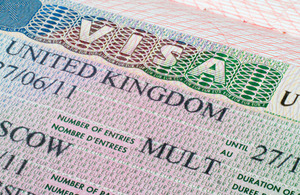Business and trade groups say points-based model needs to provide access to the labour and skills to support the economy
The UK's five largest business organisations on Friday sent a letter to Home Secretary Priti Patel offering to help the Government design Britain's new post-Brexit immigration system.
 Image credit: UK GovernmentOver 30 leading trade associations also signed the letter, joining the British Chambers of Commerce (BCC), the Confederation of British Industry (CBI), the Federation of Small Businesses (FSB), the Institute of Directors (IoD), and the manufacturers' organisation MakeUK.
Image credit: UK GovernmentOver 30 leading trade associations also signed the letter, joining the British Chambers of Commerce (BCC), the Confederation of British Industry (CBI), the Federation of Small Businesses (FSB), the Institute of Directors (IoD), and the manufacturers' organisation MakeUK.
The organisations say the their input can help ensure the new points-based model provides greater control, whilst providing access to the labour and skills needed to support the economy.
As noted by BBC News, the letter also sets out business' four key priorities for the new immigration system, including calling for a reformed sponsorship process and for the new points-based system to offer flexibility for skilled workers to enter the UK.
A Home Office spokesman told the BBC: "We will continue to speak with businesses of all sizes as the system is designed and rolled out."
The organisations' letter is reproduced below. You can see the full list of signatories here.
____________________________
24 January 2020
The Rt Hon Priti Patel MP
Secretary of State for the Home Department
2 Marsham Street
London
SW1P 4DF
Dear Home Secretary,
Fair and sustainable immigration is critical for growth across the UK. It is a top priority for businesses and the signatories of this letter. Together, we represent hundreds of thousands of firms of every size, sector and region, employing millions of people. We are writing to offer our help to make the new immigration system a success.
Recent announcements have increased optimism about how a system might work. A new two-year post-study work visa for international students, dropping the target to reduce net migration to the "tens of thousands" and signals that the £30,000 minimum salary test may change are welcome and have sent positive and important signals around the world that the UK is open for business.
Business understands that the immigration system must change in order to re-build public confidence. Insight from enterprise can help build a points-based model that provides greater control, whilst providing access to the labour and skills needed to support the economy. And this can go hand in hand with a continued determination to invest in training home grown talent.
There are four key priorities that will help to ensure the new system works on day one for all UK regions and nations:
• A minimum salary threshold can work if it is set at a level that supports the economy and protects wages – the right threshold can provide confidence that migrants are not accepting wages lower than those of UK workers. This is currently achieved in the non-EU immigration system by requiring a salary that is both higher than 25% of people in the same occupation and higher than 25% of jobs across all occupations of the relevant skill level. The Migration Advisory Committee already recommends lowering the skill level to 'A-Level' or equivalent to secure a work visa post-Brexit. Following this tried and tested formula would mean that a worker from overseas would have to earn both more than £20,100 and more than 25% of people doing the same job. This would protect wages and ensure that shortages in jobs such as technicians, carpenters, translators and care-home managers can be addressed.
• Flexibility for skilled workers to enter the UK through a points-based system – salary isn't the only way to predict somebody's contribution, so an ability to hire people with lower salaries based on their qualifications, work experience and other attributes is welcome. This must add flexibility for businesses to hire the labour and skills they need, rather than be an additional requirement. A new unsponsored points-based route for skilled workers is particularly important for smaller businesses and should also be added. Additionally, lowering the salary threshold for shortage occupations is a principle we warmly support.
• A temporary visa route which supports all sectors of the economy – extending this unsponsored route from one to two years will encourage migrant workers to integrate into local communities whilst also ensuring they are more productive, rather than businesses having to constantly start over by hiring new people. Making this route available to all sectors, with a cooling-off period reduced to six months, will help companies plug vital skills and labour gaps. In-country switching to the skilled worker visa, if the eligibility criteria is subsequently met, should also be allowed.
• A radically reformed sponsorship process in place for the first day of operation – the government's ambition to radically simplify the current sponsorship system is both welcome and essential to reduce cost and complexity for firms hiring from overseas. Completing and testing these reforms before switching to the new system will help smaller companies avoid expensive legal advice. Minor adjustments to the existing non-EU visa route would be insufficient and act as a major barrier to accessing the skills needed to grow the economy.
The economy needs a simple, streamlined and affordable system that meets business' needs of all sizes, sectors and across all UK regions and nations.
We look forward to working with the new government to inform the detailed design of a new immigration system in a way that commands public confidence and supports the UK's global ambitions.
Yours sincerely,